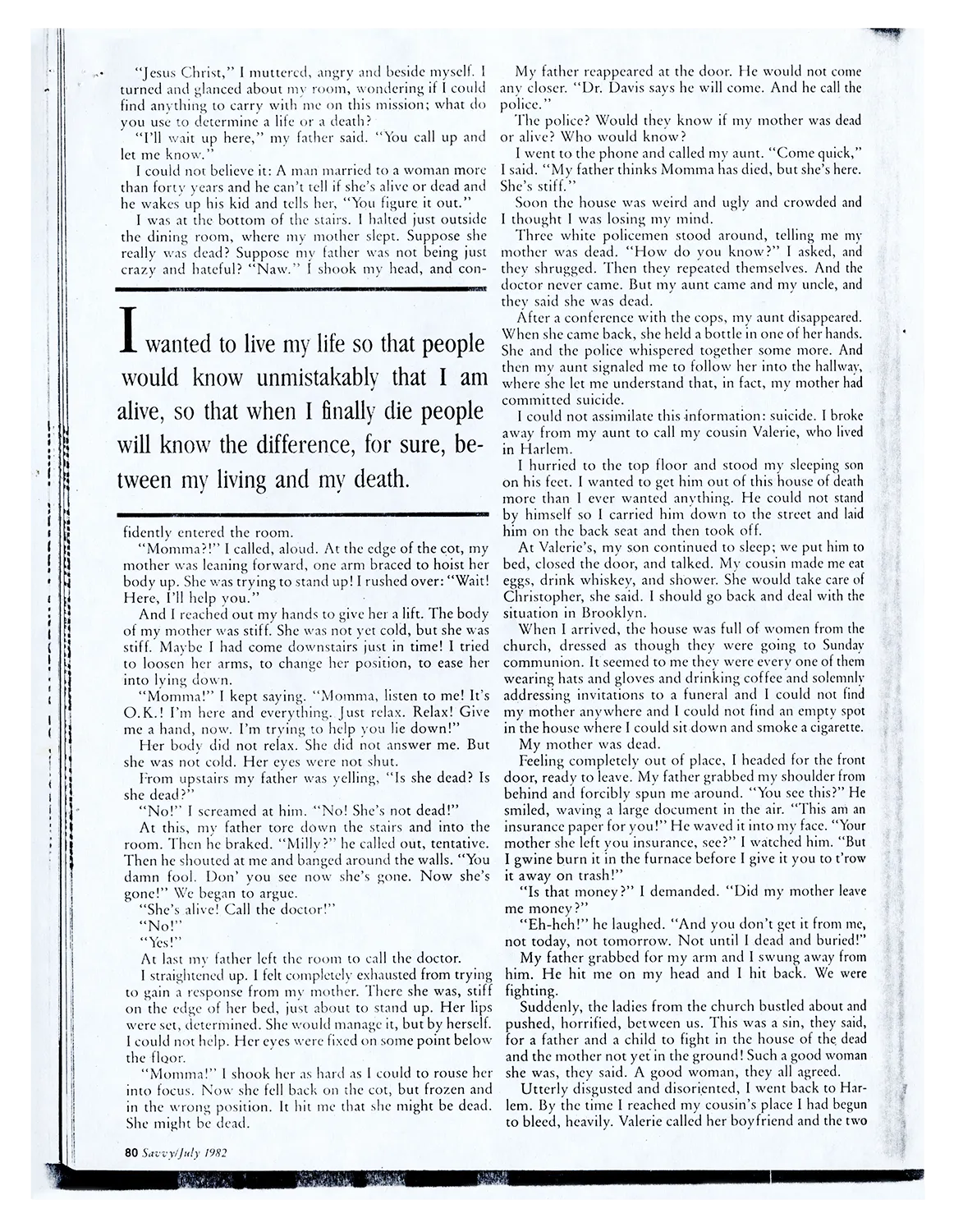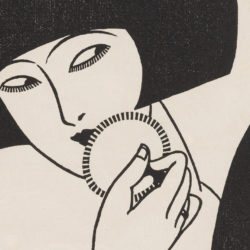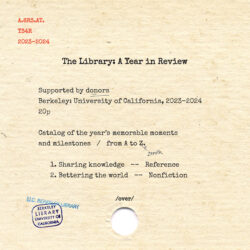
Please be aware that this article contains a depiction of suicide.
In “A Legacy of Strength,” published by Savvy in 1982, Jordan writes: “I wanted to live my life so that people would know unmistakably that I am alive, so that when I finally die people will know the difference, for sure, between my living and my death.” Jordan’s writing captures the life-and-death realities of being a Black bisexual woman. As evident in her work, poetry and writing was a form of breathing and a confirmation of aliveness.
“Jesus Christ,” I muttered, angry and beside myself. I turned and glanced about my room, wondering if I could find anything to carry with me on this mission; what do you use to determine a life or a death?“I’ll wait up here,” my father said. “You call up and let me know.”
I could not believe it: A man married to a woman more than forty years and he can’t tell if she’s alive or dead and he wakes up his kid and tells her, “You figure it out.”
I was at the bottom of the stairs. I halted just outside the dining room, where my mother slept. Suppose she really was dead? Suppose my father was not being just crazy and hateful? “Naw.” I shook my head, and confidently entered the room.
“Momma?!” I called, aloud. At the edge of the cot, my mother was leaning forward, one arm braced to hoist her body up. She was trying to stand up! I rushed over: “Wait! Here, I’ll help you.”
And I reached out my hands to give her a lift. The body of my mother was stiff. She was not yet cold, but she was stiff. Maybe I had come downstairs just in time! I tried to loosen her arms, to change her position, to ease her into lying down.
“Momma!” I kept saying. “Momma, listen to me! It’s O.K.! I’m here and everything. Just relax. Relax! Give me a hand, now. I’m trying to help you lie down!”
Her body did not relax. She did not answer me. But she was not cold. Her eyes were not shut.
From upstairs my father was yelling, “Is she dead? Is she dead?”
“No!” I screamed at him. “No! She’s not dead!”
At this, my father tore down the stairs and into the room. Then he braked. “Milly?” he called out, tentative. Then he shouted at me and banged around the walls. “You damn fool. Don’ you see now she’s gone. Now she’s gone!” We began to argue.
“She’s alive! Call the doctor!”
“No!”
“Yes!”
At last my father left the room to call the doctor.
I straightened up. I felt completely exhausted from trying to gain a response from my mother. There she was, stiff on the edge of her bed, just about to stand up. Her lips were set, determined. She would manage it, but by herself. I could not help. Her eyes were fixed on some point below the floor.
“Momma!” I shook her as hard as I could to rouse her into focus. Now she fell back on the cot, but frozen and in the wrong position. It hit me that she might be dead. She might be dead.
My father reappeared at the door. He would not come any closer. “Dr. Davis says he will come. And he call the police.”
The police? Would they know if my mother was dead or alive? Who would know?
I went to the phone and called my aunt. “Come quick,” I said. “My father thinks Momma has died, but she’s here. She’s stiff.”
Soon the house was weird and ugly and crowded and I thought I was losing my mind.
Three white policemen stood around, telling me my mother was dead. “How do you know?” I asked, and they shrugged. Then they repeated themselves. And the doctor never came. But my aunt came and my uncle, and they said she was dead.
After a conference with the cops, my aunt disappeared. When she came back, she held a bottle in one of her hands. She and the police whispered together some more. And then my aunt signaled me to follow her into the hallway, where she let me understand that, in fact, my mother had committed suicide.
I could not assimilate this information: suicide. I broke away from my aunt to call my cousin Valerie, who lived in Harlem.
I hurried to the top floor and stood my sleeping son on his feet. I wanted to get him out of this house of death more than I ever wanted anything. He could not stand by himself so I carried him down to the street and laid him on the back seat and then took off.
At Valerie’s, my son continued to sleep; we put him to bed, closed the door, and talked. My cousin made me eat eggs, drink whiskey, and shower. She would take care of Christopher, she said. I should go back and deal with the situation in Brooklyn.
When I arrived, the house was full of women from the church, dressed as though they were going to Sunday communion. It seemed to me they were every one of them wearing hats and gloves and drinking coffee and solemnly addressing invitations to a funeral and I could not find my mother anywhere and I could not find an empty spot in the house where I could sit down and smoke a cigarette.
My mother was dead.
Feeling completely out of place, I headed for the front door, ready to leave. My father grabbed my shoulder from behind and forcibly spun me around. “You see this?” He smiled, waving a large document in the air. “This am an insurance paper for you!” He waved it into my face. “Your mother she left you insurance, see?” I watched him. “But I gwine burn it in the furnace before I give it you to t’row it away on trash!”
“Is that money?” I demanded. “Did my mother leave me money?”
“Eh-heh!” he laughed. “And you don’t get it from me, not today, not tomorrow. Not until I dead and buried!”
My father grabbed for my arm and I swung away from him. He hit me on my head and I hit back. We were fighting.
Suddenly, the ladies from the church bustled about and pushed, horrified, between us. This was a sin, they said, for a father and a child to fight in the house of the dead and the mother not yet in the ground! Such a good woman she was, they said. A good woman, they all agreed.
Utterly disgusted and disoriented, I went back to Harlem. By the time I reached my cousin’s place I had begun to bleed, heavily. Valerie called her boyfriend and the two (continued on next page)
“A Legacy of Strength,” by June Jordan, Savvy, 1982, Carton 6:51, Barbara Christian papers, BANC MSS 2003/199 c, The Bancroft Library, University of California, Berkeley.




